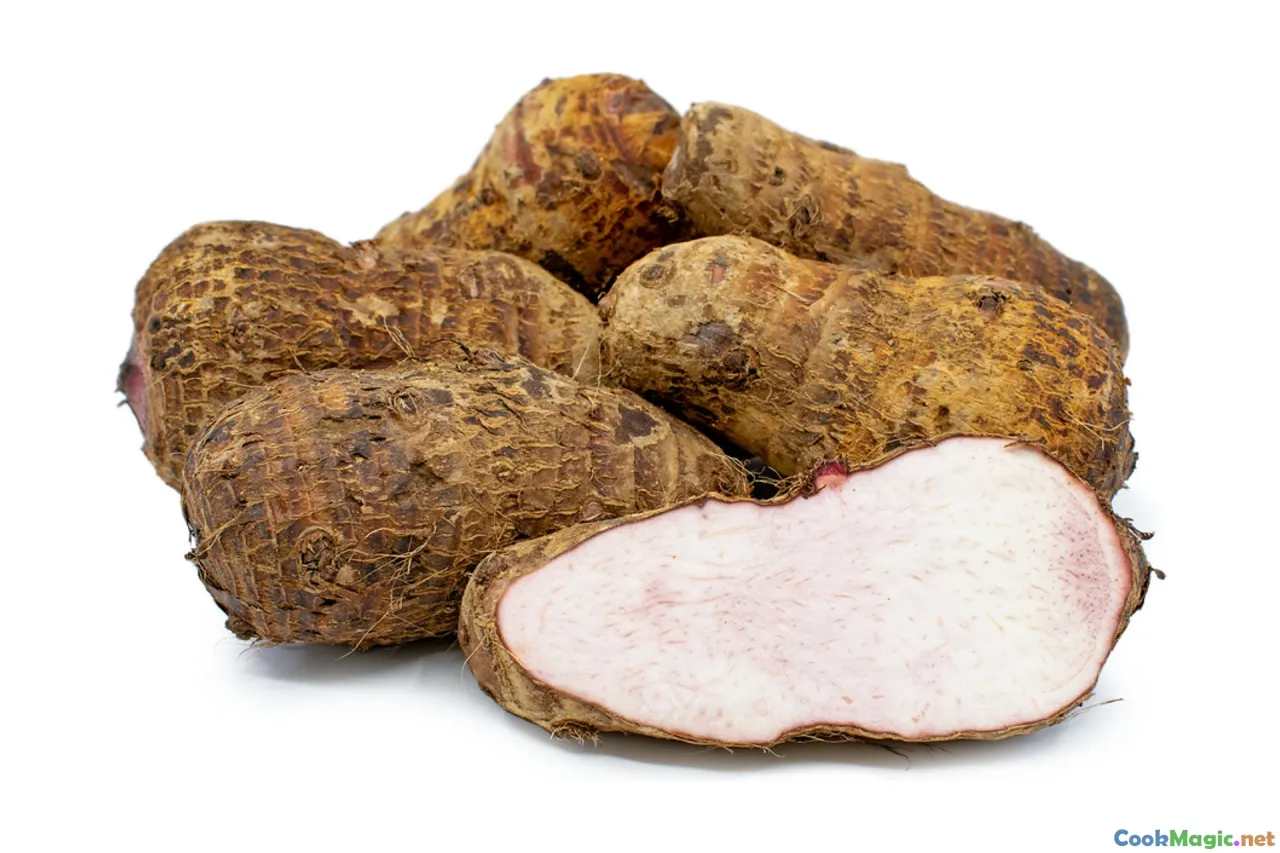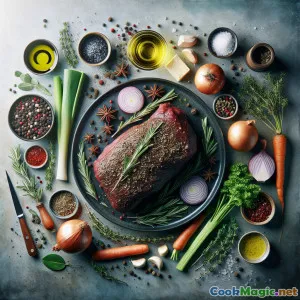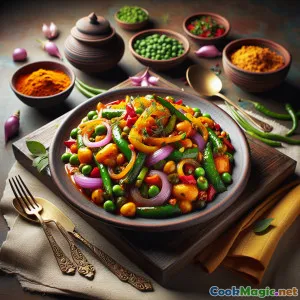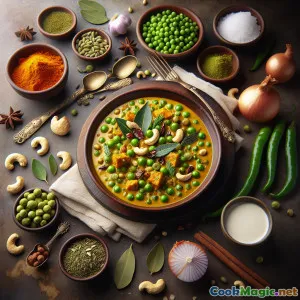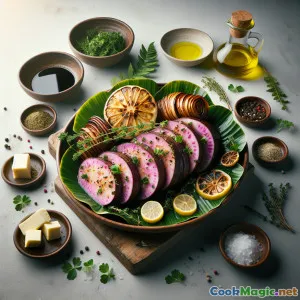
Festa de Taro Assado Lovo: Uma Tradição Insulana Defumada
(Lovo Roasted Taro Feast: A Smoky Island Tradition)
(0 Avaliações)0
741
julho 20, 2025
Reportar um problema
Ingredientes
-
1000 grams Raiz de taro
(Peeled, cut into large chunks)
-
3 large Folhas de banana
(For wrapping, can substitute parchment)
-
2 teaspoons Sal de mar defumado
(Regular sea salt can be used)
-
3 tablespoons Azeite
-
1 teaspoon Raspas de limão
(Adds bright citrus profile)
-
5 sprigs Ramos de tomilho fresco
(Or use rosemary for a different aroma)
-
1 teaspoon Pimenta preta
(Recém quebrado)
-
30 grams Manteiga
(Unsalted, can swap with vegan butter)
-
2 tablespoons Salsa Picada
(Para guarnição)
(Peeled, cut into large chunks)
(For wrapping, can substitute parchment)
(Regular sea salt can be used)
(Adds bright citrus profile)
(Or use rosemary for a different aroma)
(Recém quebrado)
(Unsalted, can swap with vegan butter)
(Para guarnição)
Nutrição
- Porções: 4
- Tamanho da Porção: 1 prato (250g)
- Calories: 370 kcal
- Carbohydrates: 0 g
- Protein: 4 g
- Fat: 12 g
- Fiber: 7 g
- Sugar: 2 g
- Sodium: 650 mg
- Cholesterol: 8 mg
- Calcium: 65 mg
- Iron: 1.5 mg
Instruções
-
1 - Prep Taro:
Wash, peel, and cut the taro into large, equal-sized chunks. Pat dry to ensure even roasting.
-
2 - Marinate:
In a large bowl, toss the taro chunks with olive oil, smoked sea salt, black pepper, and, if using, lemon zest. Allow to marinate for maximum flavor.
-
3 - Prepare Banana Leaves:
Quickly blanch or warm banana leaves over a flame to soften. Wipe clean and cut into large pieces for wrapping.
-
4 - Assemble for Roasting:
Lay banana leaves on a work surface. Place half the thyme at the center, arrange marinated taro on top, dot with butter, top with remaining thyme, and tuck into a secure parcel.
-
5 - Roast Lovo-Style:
Preheat the oven to 200°C (390°F). Place the banana leaf parcels on a baking tray. Roast for 70 minutes, turning once, until taro is tender and aromatic.
-
6 - Serve:
Carefully unwrap, plate gently, drizzle with extra olive oil, and scatter with chopped parsley. Serve hot as a hearty main or a side.
Wash, peel, and cut the taro into large, equal-sized chunks. Pat dry to ensure even roasting.
In a large bowl, toss the taro chunks with olive oil, smoked sea salt, black pepper, and, if using, lemon zest. Allow to marinate for maximum flavor.
Quickly blanch or warm banana leaves over a flame to soften. Wipe clean and cut into large pieces for wrapping.
Lay banana leaves on a work surface. Place half the thyme at the center, arrange marinated taro on top, dot with butter, top with remaining thyme, and tuck into a secure parcel.
Preheat the oven to 200°C (390°F). Place the banana leaf parcels on a baking tray. Roast for 70 minutes, turning once, until taro is tender and aromatic.
Carefully unwrap, plate gently, drizzle with extra olive oil, and scatter with chopped parsley. Serve hot as a hearty main or a side.
Mais sobre: Festa de Taro Assado Lovo: Uma Tradição Insulana Defumada
Lovo Roasted Taro Feast: A Modern Island Comfort Delivered through English Flair
From the lush green islands of the Pacific comes the ancient art of lovo – an earth oven cooking style centered around smoking roots, seafood, and hearty vegetables in a slow-cooked marvel reminiscent of a grand campfire feast. Taro, a starchy and beloved root prized across the world for its nutty taste and silky-smooth flesh, is spotlighted here in this imaginative English twist: Lovo Roasted Taro Feast. Trading volcanic soil for the conventional stovetop and baking tray, this recipe pays homage to Fijian culture while applying familiar Western culinary elements, resulting in one of the most comforting, earthy, and hearty vegetarian mains currently found at the crossroads of cuisine.
The History and Tradition Behind Lovo and Taro
Fijian and wider Melanesian cuisine deeply celebrates the process of slow-cooking food over heated rocks in subterranean ovens buried beneath layers of banana and taro leaves. Historically, gatherings marked by lovo represent togetherness, story-exchange, and feast – not merely eating, but a ritual of patience and anticipation. Taro (known also as "cocoyam" or "dasheen") constitutes an essential energy food and is legendary for its uniquely dense, almost creamy texture when properly gentle-roasted or slow-steamed.
Modernizing the Lovo for the Home Kitchen
While not everyone has a volcanic rock oven or access to earth ovens, the technique of steaming and smoking within leafy parcels translates beautifully to a British or any global kitchen equipped with an oven. Banana leaves, sourced from specialty food markets or Asian groceries, import a gentle grassy perfume to replace the missing embers. Olive oil and infused thyme add English countryside flavors, morphing the native island formula into something soulful for a London Sunday lunch or rural gathering.
Tips, Notes, and Unique Touches
- Banana leaf prep: If unavailable, food-grade parchment or corn husks perform reliably, albeit with less aroma.
- Taro preparatory note: Don't skip drying well before roasting; this ensures textural perfection. Those unused to taro should note to avoid any with pink or purple blotches after cutting, as this hints at spoilage.
- Thyme vs. Rosemary: Classic lovo rarely deploys Western herbs; including them here sweetly acknowledges the British countryside.
- Smoky seasoning: The addition of British-style smoked sea salt, inspired by lovo's earthy vapor, replicates the gusty tang left behind by smoky embers.
- Pairing: Offer with herbed yogurt sauce or a lush watercress salad for further Anglo flavor blending.
- Culturally conscious: While this dish is a playful fusion, partake with awareness of lovo's origin as a communal rite.
Unique Aspects and Personal Thoughts:
What distinguishes Lovo Roasted Taro Feast from standard roasted root vegetables is how it transforms simplicity into spectacle: smoke, herbs, and slick green fragrance invite rustic theater to the table, encouraging guests to participate in the ceremonial unwrapping of piping parcels. More than a side, taro ascends to celebration status—a focus for vegetarian feasters and lovers of rare starches seeking the familiar hug of roasted potatoes made new.
Consider serving at countryside gatherings or rain-drenched autumn meals. With every mouthful earthy and moist, flecked with bursts of citrusess and perfume, this recipe roots you not just in place, but in the loving practice of globalism through food. Experiment by tucking other root treasures—parsnip or purple yam will also behave beautifully—for an engaging riff. Embracing humble taro's slow metamorphosis is an invitation to savor the deep connections found in both Pacific tradition and English hospitality.
In a world increasingly defined by borrowed customs and cross-cultural feasts, Lovo Roasted Taro Feast celebrates solidarity, innovation, and the elemental comfort found at the heart of human gatherings.



